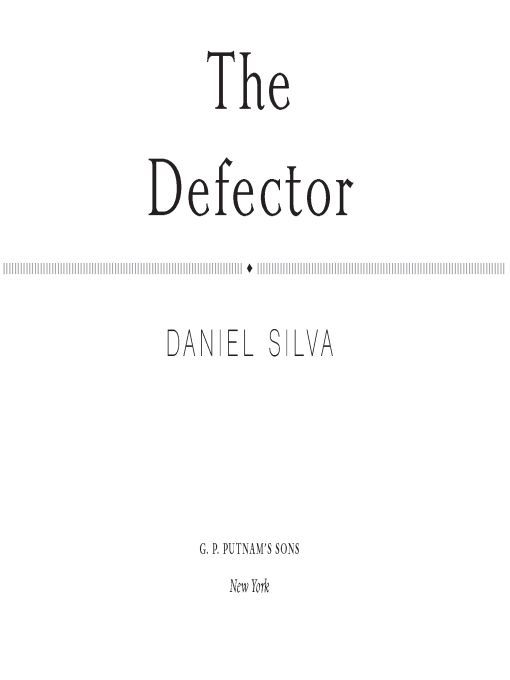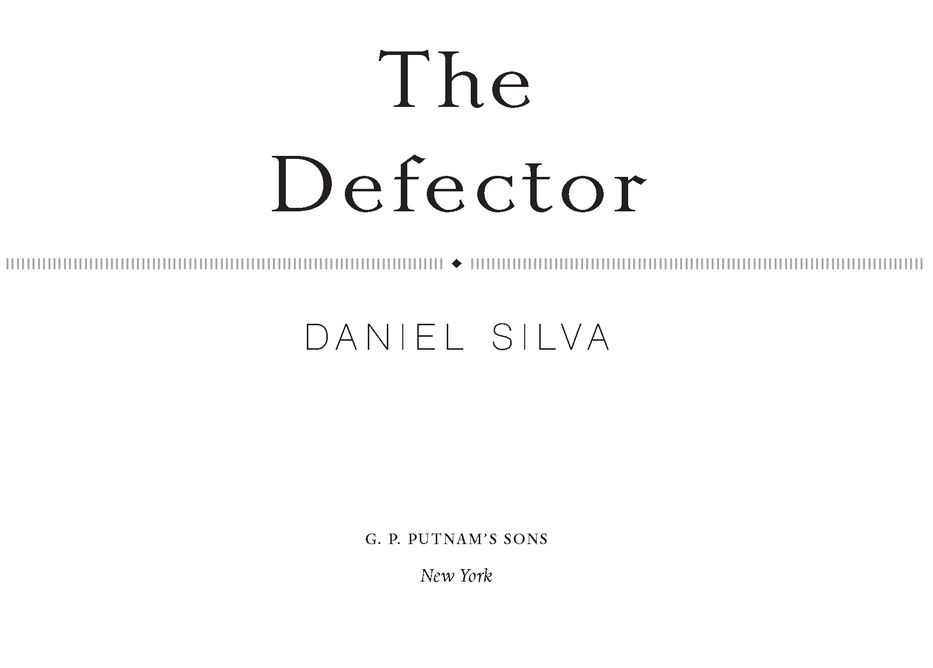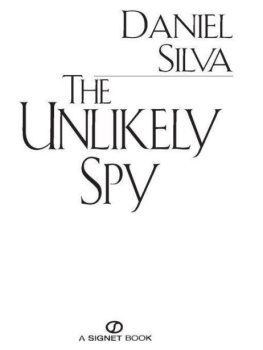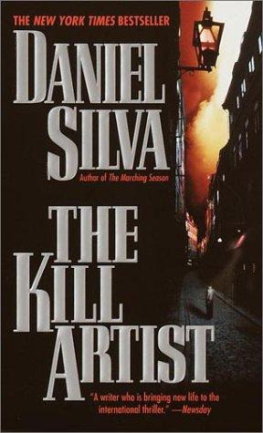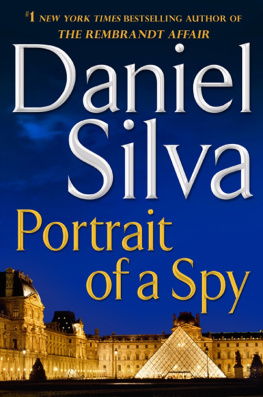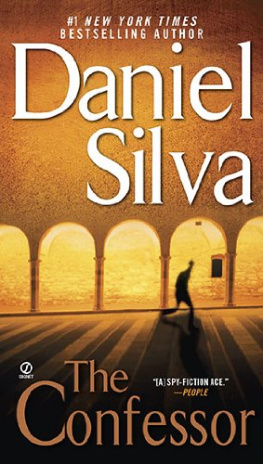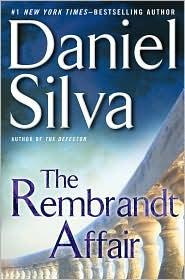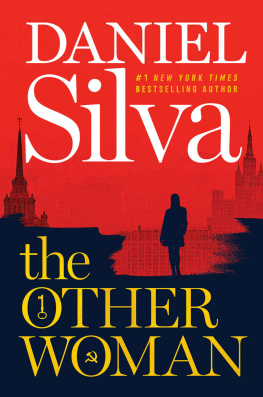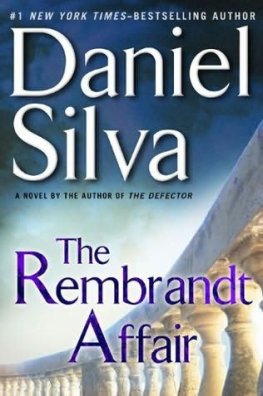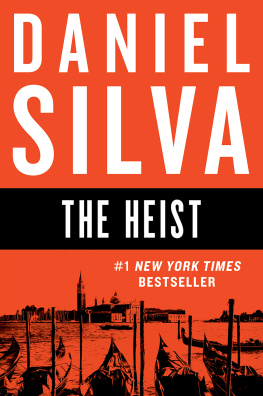Table of Contents
ALSO BY DANIEL SILVA
Moscow Rules
The Secret Servant
The Messenger
Prince of Fire
A Death in Vienna
The Confessor
The English Assassin
The Kill Artist
The Marching Season
The Mark of the Assassin
The Unlikely Spy
For Marilyn Ducksworth,
for many years of friendship,
support, and laughter.
And as always, for my wife, Jamie,
and my children, Nicholas and Lily.
If an injury has to be done to a man it should be so severe
that his vengeance need not be feared.
MACHIAVELLI
PART ONE
Opening Moves
VLADIMIRSKAYA OBLAST, RUSSIA
PYOTR LUZHKOV was about to be killed, and for that he was grateful.
It was late October, but autumn was already a memory. It had been brief and unsightly, an old babushka hurriedly removing a threadbare frock. Now this: leaden skies, arctic cold, windblown snow. The opening shot of Russias winter without end.
Pyotr Luzhkov, shirtless, barefoot, hands bound behind his back, was scarcely aware of the cold. In fact, at that moment he would have been hard-pressed to recall his name. He believed he was being led by two men through a birch forest but could not be certain. It made sense they were in a forest. That was the place Russians liked to do their blood work. Kurapaty, Bykivnia, Katyn, Butovo... Always in the forests. Luzhkov was about to join a great Russian tradition. Luzhkov was about to be granted a death in the trees.
There was another Russian custom when it came to killing: the intentional infliction of pain. Pyotr Luzhkov had been forced to scale mountains of pain. They had broken his fingers and his thumbs. They had broken his arms and his ribs. They had broken his nose and his jaw. They had beaten him even when he was unconscious. They had beaten him because they had been told to. They had beaten him because they were Russians. The only time they had stopped was when they were drinking vodka. When the vodka was gone, they had beaten him even harder.
Now he was on the final leg of his journey, the long walk to a grave with no marker. Russians had a term for it: vyshaya mera, the highest form of punishment. Usually, it was reserved for traitors, but Pyotr Luzhkov had betrayed no one. He had been duped by his masters wife, and his master had lost everything because of it. Someone had to pay. Eventually, everyone would pay.
He could see his master now, standing alone amid the match-stick trunks of the birch trees. Black leather coat, silver hair, head like a tank turret. He was looking down at the large-caliber pistol in his hand. Luzhkov had to give him credit. There werent many oligarchs who had the stomach to do their own killing. But then there werent many oligarchs like him.
The grave had already been dug. Luzhkovs master was inspecting it carefully, as if calculating whether it was big enough to hold a body. As Luzhkov was forced to kneel, he could smell the distinctive cologne. Sandalwood and smoke. The smell of power. The smell of the devil.
The devil gave him one more blow to the side of his face. Luzhkov didnt feel it. Then the devil placed the gun to the back of Luzhkovs head and bade him a pleasant evening. Luzhkov saw a pink flash of his own blood. Then darkness. He was finally dead. And for that he was grateful.
LONDON: JANUARY
THE MURDER of Pyotr Luzhkov went largely unnoticed. No one mourned him; no women wore black for him. No Russian police officers investigated his death, and no Russian newspapers bothered to report it. Not in Moscow. Not in St. Petersburg. And surely not in the Russian city sometimes referred to as London. Had word of Luzhkovs demise reached Bristol Mews, home of Colonel Grigori Bulganov, the Russian defector and dissident, he would not have been surprised, though he would have felt a pang of guilt. If Grigori hadnt locked poor Pyotr in Ivan Kharkovs personal safe, the bodyguard might still be alive.
Among the lords of Thames House and Vauxhall Cross, the riverfront headquarters of MI5 and MI6, Grigori Bulganov had always been a source of much fascination and considerable debate. Opinion was diverse, but then it usually was when the two services were forced to take positions on the same issue. He was a gift from the gods, sang his backers. He was a mixed bag at best, muttered his detractors. One wit from the top floor of Thames House famously described him as the defector Downing Street needed like a leaky roofas if London, now home to more than a quarter million Russian citizens, had a spare room for another malcontent bent on making trouble for the Kremlin. The MI5 man had gone on the record with his prophecy that one day they would all regret the decision to grant Grigori Bulganov asylum and a British passport. But even he was surprised by the speed with which that day came.
A former colonel in the counterintelligence division of the Russian Federal Security Service, better known as the FSB, Grigori Bulganov had washed ashore late the previous summer, the unexpected by-product of a multinational intelligence operation against one Ivan Kharkov, Russian oligarch and international arms dealer. Only a handful of British officials were told the true extent of Grigoris involvement in the case. Fewer still knew that, if not for his actions, an entire team of Israeli operatives might have been killed on Russian soil. Like the KGB defectors who came before him, Grigori vanished for a time into a world of safe houses and isolated country estates. A joint Anglo-American team hammered at him day and night, first on the structure of Ivans arms-trafficking network, for which Grigori had shamefully worked as a paid agent, then on the tradecraft of his former service. The British interrogators found him charming; the Americans less so. They insisted on fluttering him, which in Agencyspeak meant subjecting him to a lie-detector test. He passed with flying colors.
When the debriefers had had their fill, and it came time to decide just what to do with him, the bloodhounds of internal security conducted highly secret reviews and issued their recommendations, also in secret. In the end, it was deemed that Grigori, though reviled by his former comrades, faced no serious threat. Even the once-feared Ivan Kharkov, who was licking his wounds in Russia, was deemed incapable of concerted action. The defector made three requests: he wanted to keep his name, to reside in London, and to have no overt security. Hiding in plain sight, he argued, would give him the most protection from his enemies. MI5 readily agreed to his demands, especially the third. Security details required money, and the human resources could be put to better use elsewhere, namely against Britains homegrown jihadist extremists. They bought him a lovely mews cottage in a backwater of Maida Vale, arranged a generous monthly stipend, and made a onetime deposit in a City bank that would surely have caused a scandal if the amount ever became public. An MI5 lawyer quietly negotiated a book deal with a respected London publisher. The size of the advance raised eyebrows among the senior staff of both services, most of whom were working on books of their ownin secret, of course.
For a time it seemed Grigori would turn out to be the rarest of birds in the intelligence world: a case without complications. Fluent in English, he took to life in London like a freed prisoner trying to make up for lost time. He frequented the theater and toured the museums. Poetry readings, ballet, chamber music: he did them all. He settled into work on his book and once a week lunched with his editor, who happened to be a porcelain-skinned beauty of thirty-two. The only thing missing in his life was chess. His MI5 minder suggested he join the Central London Chess Club, a venerable institution founded by a group of civil servants during the First World War. His application form was a master-piece of ambiguity. It supplied no address, no home telephone, no mobile, and no e-mail. His occupation was described as translation services, his employer as self. Asked to list any hobbies or outside interests, he had written chess.

